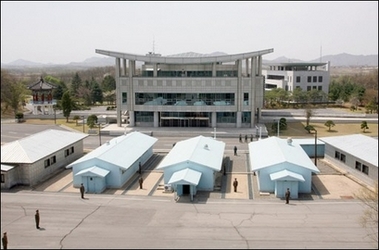国际新闻:US targets 2008 for implementing NK deal
WASHINGTON - The United States has set 2008 as the target for full implementation of an accord to end North Korea's nuclear drive, including a final peace deal for the Korean peninsula, top US nuclear envoy Christopher Hill said Monday.
 The truce village in Panmunjom, in the Demilitarized Zone (DMZ), seen from the North Korean side of the border. The United States has set 2008 as the target for full implementation of an accord to end North Korea's nuclear drive, including a final peace deal for the Korean peninsula, top US nuclear envoy Christopher Hill said Monday. [Agencies] |
"The sooner the better, I mean, from my humble perspective. But in 2008 we would hope to wrap this up. I hope it wouldn't take 12 months," Hill said.
With the next US presidential elections in November 2008, the administration of President George W. Bush is eager to complete the implementation of the complex nuclear deal before he vacates the White House.
Under the deal, North Korea has to disable its nuclear program in return for aid and diplomatic and security guarantees, including diplomatic relations with Washington and a permanent accord to formally end the 1950-53 Korean War.
North Korea has already shut down its main Yongbyon nuclear reactor as promised under a February 13 accord reached by the six parties - the United States, China, Russia, the two Koreans and Japan.
In September, the six parties hope to adopt a comprehensive program with possibly a 2007 deadline for North Korea to declare and disable its entire nuclear program under phase two of the nuclear accord.
Hill said that "realistically speaking, if we can get phase two done by the end of the year, then we can address some of the other elements that are there," citing as an example the planned setting up of a Northeast Asian security forum and signing of a peace treaty to officially end the Korean War.
"And realistically speaking, if we can't get that (second phase) going by the end of '07, it's going to be tough to complete it by the end of '08, which would be our target time," Hill said.
Hill hinted of difficulties facing such planned time frames.
"I suspect we're going to have some eleventh-hour negotiations," he said of the process of putting together a so-called "sequencing plan" with the disabling of North Korea's nuclear program.
"So let's see if we can get something that makes sense by early September and then try to implement it," he said.
Once the program for North Korea to disable its nuclear program is ready in September, Hill said foreign ministers of the six countries would meet for the first time since the talks began in 2003 "to bless what we've done and look ahead."
Asked whether North Korea would have enough time to disband its nuclear program within three months from September as anticipated, Hill said: "My own view is yes, it could be done.
"If they want to get it done, it can be done. I think disabling activities are not a matter of months; they're a matter of weeks," he said.
Hill explained that the program to disband the nuclear activities was linked to energy aid - totalling 950,000 tonness of heavy fuel oil or the equivalent of that in economic assistance - to North Korea.
Pyongyang, facing storage problems, may not be able to absorb all the pledged fuel within a short time and a working group would determine what kind of equivalent aid could be given, he said.
On North Korea's demand for a light-water reactor as compensation for shutting down its nuclear program, Hill said Washington was prepared to discuss it when North Korea"gets out of this dirty nuclear business that they've been in and returns to the NPT (Nuclear Non-Proliferation Treaty)."
The six nations agreed in September 2005
相关文章
- 欧美文化:Sri Lankan military authorized to maintain law, order amid unrest
- 欧美文化:Russian FM visits Algeria to mark 60th anniversary of ties
- 欧美文化:Turkey, Kazakhstan aim to reach 10 bln USD in bilateral trade: president
- 欧美文化:Moroccan, Egyptian FMs discuss prospects of bolstering cooperation
- 欧美文化:Macron visits Berlin on first foreign trip after re-election
- 欧美文化:Ukrainian president, Swedish PM discuss defense support for Ukraine over phone
- 欧美文化:Two suspects arrested for killing 3 Israelis in stabbing attack
- 欧美文化:Russia says 50 more civilians evacuated from Azovstal
- 欧美文化:Putin, Bennett discuss Ukraine over phone
- 欧美文化:U.S. FDA limits use of Johnson & Johnson COVID-19 vaccine over blood clot risk




 手机网站
手机网站